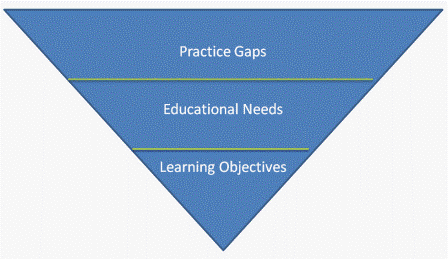
Step I: Planning Your CME Event
Practice Gap Analysis and Assessing the Needs of Your Learners
Why am I doing this educational activity?
This is the critical question that should be the starting point for any CME activity.
In the answer to this question lies the relevance of your activity to the needs of your audience,
and the potential for effecting change in your learner's performance.
CME planners should query themselves in the following fashion:
- What problem (in clinical practice) do we want to address?
- Is this a significant problem for our learners?
- What is the magnitude of the problem? (so you can track outcome improvement)
- Why does the problem exist?
- What change do we seek?
- What should we do to make change happen?
This is the part of educational planning that is about practice gap analysis and needs assessment.
Practice gaps are expressions or manifestations of a need on the part of the clinicians who are your learners.
You are encouraged to investigate real practice gaps and practice-based needs for your activity by taking advantage of internal and external sources of performance data:
- Performance databases and web sites (i.e., AHQR)
- Input and Feedback from your Learners
- Institutional Performance Data and Benchmarks
- Practice-Based Audits
Having identified and quantified a practice gap that you wish to address in your activity, you reflect on the educational needs that underlie the problem.
The need may be a need for new information, but it may be a need to provide clinicians with practical strategies, behavioral skills, or system improvement information.
These needs must be given consideration in your educational planning of CME.
Having named the various educational needs, you then choose which need(s) you will focus on in your activity.
You are then expected to develop and articulate concrete learning objectives linked to the needs you have identified among your learners.
This process has a funneling effect going from broad and general to more specific:
